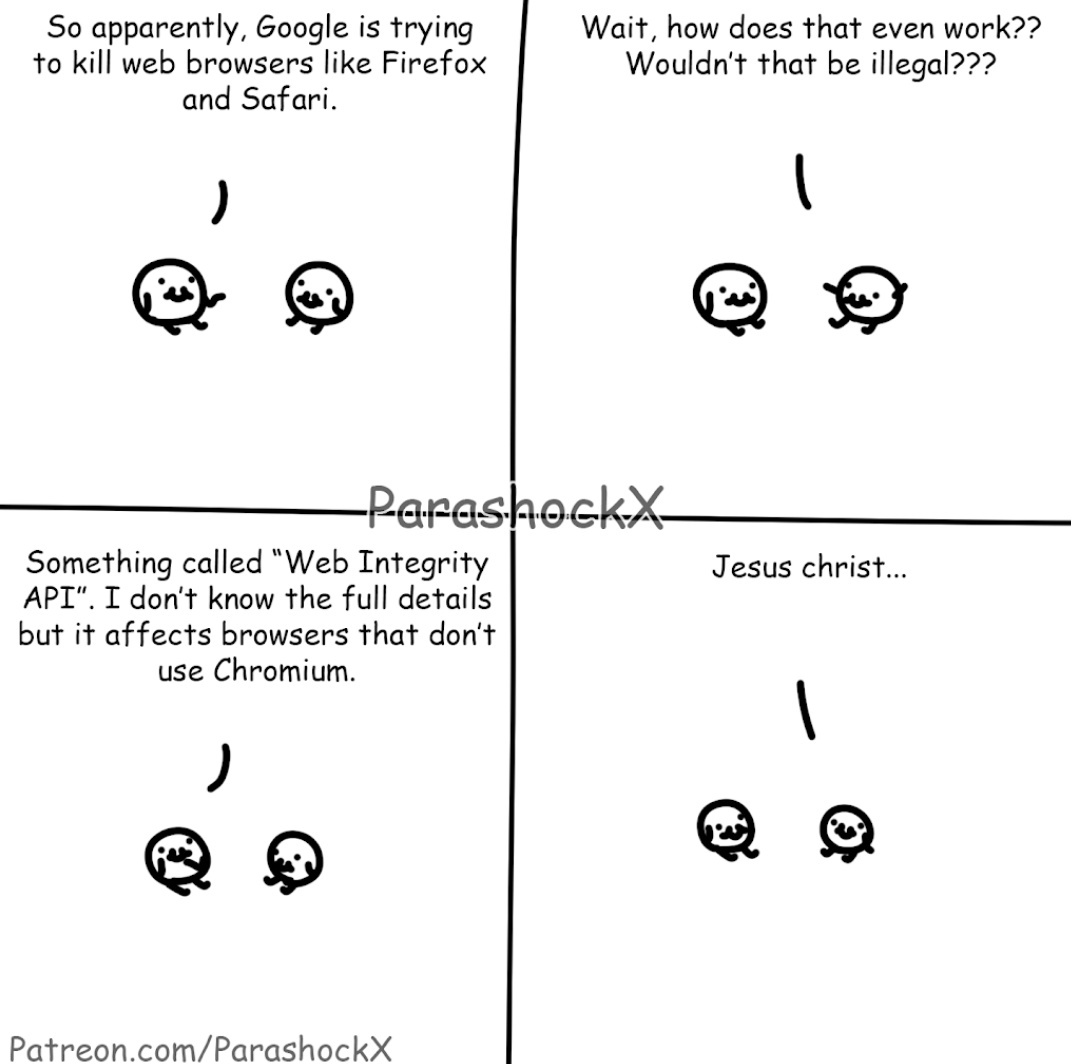this post was submitted on 12 Oct 2023
800 points (100.0% liked)
196
18403 readers
711 users here now
Be sure to follow the rule before you head out.
Rule: You must post before you leave.
Other rules
Behavior rules:
- No bigotry (transphobia, racism, etc…)
- No genocide denial
- No support for authoritarian behaviour (incl. Tankies)
- No namecalling
- Accounts from lemmygrad.ml, threads.net, or hexbear.net are held to higher standards
- Other things seen as cleary bad
Posting rules:
- No AI generated content (DALL-E etc…)
- No advertisements
- No gore / violence
- Mutual aid posts are not allowed
NSFW: NSFW content is permitted but it must be tagged and have content warnings. Anything that doesn't adhere to this will be removed. Content warnings should be added like: [penis], [explicit description of sex]. Non-sexualized breasts of any gender are not considered inappropriate and therefore do not need to be blurred/tagged.
If you have any questions, feel free to contact us on our matrix channel or email.
Other 196's:
founded 2 years ago
MODERATORS
you are viewing a single comment's thread
view the rest of the comments
view the rest of the comments

From my understanding, it allows a website to check if you’re running a Chromium browser, and block your access to the site or to features of the site if you aren’t
Well then I am a chromium browser. At least as long you need to think that.
What technology they are using I can't fake on a Firefox?
This is why google wanted to deprecate the User-Agent header.
god that'll make it impossible to do a bunch of frontend work for anything but their browser. which is another reason they want to do it, i'm sure
... Oh. Sorry friend, they're using TEE, trusted execution environment, aka the place where a key is put by the manufacturer and not available to the user without an exploit or taking apart the processor. Faking it isn't going to be like changing the user agent
Fun how companies came up with a way to run code on our hardware at home without our ability to modify it
Well then I won't use it and maybe cut my access to their Services
Yeah... That's about where I'm at. I figure I'll keep an old computer set up to deal with things I have to use, but the corporate Internet is really starting to suck. When Reddit went down, I started the long and painful process of finding a better way... It's going to involve quite a lot of custom solutions, but at least it starts off crappy and quickly improves instead of the opposite
Bing for enterprise is already blocking browsers that aren't Edge. Clicking "Edge" from the list of browser identities in Firefox seems to go around the block.
Soon, we'll get to "Best viewed with Chrome", "Best viewed on 1920x1080", "Google Chrome NOW!" even though other browsers could load the webpages just fine.
Oh, wait.
On what grounds? I know why google wants this, but why would the average website do this?
This goes with other changes they did to chromium. Google claims it is to prevent bots, but it really is a crackdown on ads blocking and any other "tampering" with their websites.
If you care about keeping web free, you should stop using chrome and its derivatives and switch to Firefox. They are believing that Firefox user base is low and websites can simply exclude FF and force it to implement it as well.
The 'average' website wouldn't but many of the social giants are desperately looking for a way to limit bot use. So Google gives them what they want and simultaneously gets to be the most reliable advertiser, ensuring impressions are viewed by not just a human but the right human.
How does this limit bot use? Is there something anti bot about chromium? Or does the api do more beyond checking for chromium compatible browsers
Because websites will check if you have a Web Integrity token being sent along by the browser and if it cannot find one registrations and login will be closed to your instance.
Edit: And to clarify, you will not get that token unless you verify your identity within the associated google account. Hence why only Chromium browsers will support this. But it isn't about the browser. It's about the token.
Don’t sites already do this?
browsers can currently report to be anything. which is why Google is trying to stop it.
It's not about whether it's a chromium browser or not. It's about whether a browser is "trusted" and installed from a "trusted" source, like the windows store... Basically gatekeeping. Still, Firefox and any browser could still be approved.
This would be an insane damage to the Linux community since there are many different ways to install programms(including browsers).
Absolutely! I would wager a guess that something like this would require support on a package manager level, meaning that the biggest like Ubuntu or what not could have access to a functioning "trusted" browser. But good luck on a niche distro, or if you want to compile it yourself, or if you want to use certain extensions or....
What's more trusted than source code?
According to Google - probably source code that can't block ads and that is known to not block trackers... basically.
Or the API can die a quick death, like so many other Google products.